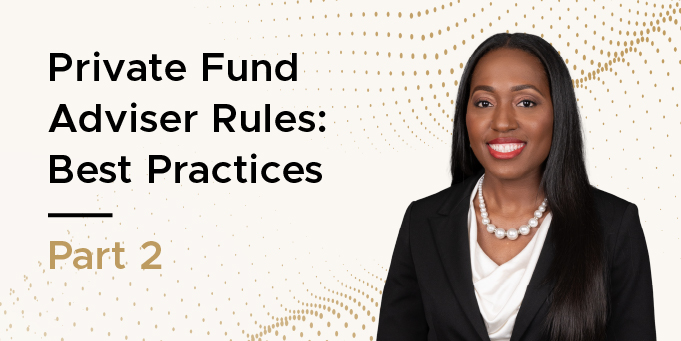Financial Services Insights – August 2014 – The Benefits of an Independent Board
- Published
- Aug 5, 2014
- Share
Concerns about internal governance of hedge funds have increased considerably in recent years. Institutional investors spend a significant amount of resources on performing due diligence on potential hedge fund investments and put a heavy emphasis on governance. Additionally, regulators like the Securities and Exchange Commission ("SEC") are demanding more from investment advisors who manage hedge funds from a risk management and regulatory prospective. The SEC is looking very closely at high-risk areas such as portfolio valuations, conflicts of interests, security of investors' assets, and group funds expenses and allocations. The corporate governance of hedge funds is more closely evaluated today than in the past and a board of directors with the majority of its members being independent to the investment advisor and the hedge fund can provide significant benefits.

Responsibilities of the Board of Directors
The board of directors has a fiduciary responsibility to the fund investors and oversight of the fund's management. The responsibilities of a board include the following:
- Detection of fraud and misconduct
- Compliance with the fund's risk management guidelines
- Compliance with the fund's investment strategy
- Monitoring of the fund's net asset value calculations and reviewing the fund's investment performance
- Appointment and performance review of service providers
- Review of the adequacy and accuracy of information provided to investors from the fund's management
A board with directors that possess the proper skills to effectively perform the responsibilities described above can help reduce operational risk and mitigate the conflicts of interest that exist between the fund manager and the fund's investors.
Institutional investors will evaluate the experience of the board members and determine if the directors possess the required skill set and are devoting enough time to their responsibilities.
| Factors to consider when selecting an independent board of directors | |
| Board structure and composition |
Hedge funds domiciled outside the U.S. will always have a board of directors. Jurisdictions like Cayman Islands, Bermuda and British Virgin Islands do not required that a majority of the board be independent but it is considered a best practice to have independent directors on their boards. In the context of hedge funds organized in the U.S. as limited partnerships or limited liability companies, the manager would establish an Advisory Board whose members would be independent. Regardless of the jurisdiction, a board with a majority of its members being independent demonstrates that the manager cares about proper supervision and that the manager is willing to be overseen by professionals who may challenge its decisions. |
| Independence |
Investors expect that an independent director should be free from conflicts of interests with the fund, its employees and service providers to ensure that nothing would interfere with the exercise of independent judgment when carrying out its duties. Requesting written affirmations of independence in advance of each individual's appointment is recommended as a best practice. |
| Qualifications |
The independent director should also be qualified to oversee and mitigate potential conflicts of interest between the fund and the manager and have adequate expertise on a wide range of matters such as portfolio management; operational and transactional due diligence; audit, legal, and regulatory issues; current market trends; general fund operations; etc. It is not necessary that every independent member of the board have all these skills but they should all be collectively represented in a qualified board. |
| Capacity | The independent director should have sufficient time to allocate to the operation of the fund so as to meet his or her fiduciary responsibilities and further ensure compliance by the fund with industry best practice for corporate governance. The analysis should not only involve the number of funds where the director serves but it might also include a qualitative analysis of the portfolio; fund structures and trading strategies of the funds where the director serves; and the infrastructure available to the director to ensure that he or she is able to perform his or her duties in an efficient manner. Past experience should also be considered. |
It is also very important that board meetings are scheduled periodically, an agenda is followed, and proper minutes are kept. Additionally, information should be sent to board members before the meetings so they have enough time to review the information and prepare for the meeting. The information provided to the board should not merely include a net assets value ("NAV") figure but should comprise detailed accounting reports such as:
- Financial position
- Statement of operations
- Fair market value estimates for non-marketable investments
- Expense allocation reports
- Capital transactions
- Detailed investment portfolio
- Securities transaction reports and names of executing brokers
A robust corporate governance structure will constitute a powerful tool in retaining existing as well as attracting new investors in an increasingly challenging regulated environment.
Claudia Osmar is a director with EisnerAmper. Questions? Contact Claudia at 212.891.6907.
Financial Services Insights – August 2014
Contact EisnerAmper
If you have any questions, we'd like to hear from you.
Receive the latest business insights, analysis, and perspectives from EisnerAmper professionals.










